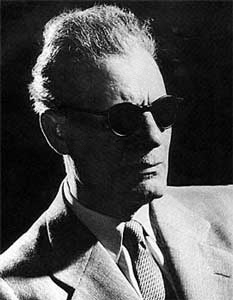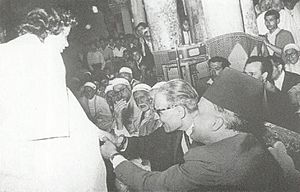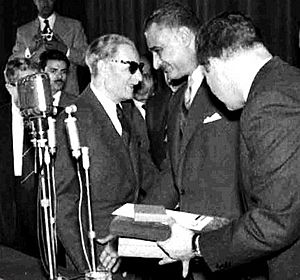Taha Hussein facts for kids
Quick facts for kids
Taha Hussein
|
|
|---|---|
 |
|
| Born | 14 November 1889 Maghagha, Khedivate of Egypt
|
| Died | 28 October 1973 (aged 83) |
| Era | Modern literary theory |
| School | Modernism, Classical Arabic literature, Nahda |
|
Main interests
|
Classical Arabic literature, Islamic history, Mediterranean culture |
|
Influences
René Descartes |
|
|
Influenced
|
|
Taha Hussein (Egyptian Arabic: [ˈtˤɑːhɑ ħ(e)ˈseːn], Arabic: طه حسين; November 15, 1889 – October 28, 1973) was a very important Egyptian writer and thinker in the 20th century. He was a key leader in the Egyptian Renaissance, a time of great cultural growth in the Middle East and North Africa. People called him "The Dean of Arabic Literature." He was even nominated for the Nobel Prize in Literature twenty-one times!
Contents
Early Life
Taha Hussein was born in a small village called Izbet el Kilo in central Upper Egypt. He was one of thirteen children in his family. When he was just two years old, he got an eye infection called ophthalmia. Sadly, a bad treatment made him blind.
Even though he was blind, Taha Hussein was very smart and loved to learn. He first went to a traditional religious school called a kuttab. Later, he studied religion and Arabic literature at El Azhar University. But he felt that the old ways of teaching were not enough for him.
When the new, modern Cairo University opened in 1908, he really wanted to go. Even though he was poor and couldn't see, he earned a spot. In 1914, he earned his first PhD. His paper was about a famous poet and philosopher named Abu al-ʿAlaʾ al-Maʿarri, who was known for being a bit of a skeptic.
Studying in France
After his first degree, Taha Hussein traveled to Montpellier, France. He joined the university there and took classes in literature, history, French, and Latin. He learned about formal writing, but it was sometimes hard because he learned best by listening, not by reading with his fingers.
He had to go back to Egypt for a short time because of problems at Cairo University. But things got better, and he soon returned to France.
After getting his master's degree from the University of Montpellier, Hussein continued his studies at the Sorbonne in Paris. He hired a woman named Suzanne Bresseau to read books to him. They fell in love and got married! In 1917, he earned a second PhD from the Sorbonne. This time, his paper was about Ibn Khaldun, a Tunisian historian who is often called the founder of modern sociology.

A Professor and Writer
In 1919, Taha Hussein and Suzanne moved back to Egypt. He became a history professor at Cairo University. Later, he taught Arabic literature and Semitic languages.
He also worked at the Academy of the Arabic Language in Cairo. There, he was in charge of finishing a very important project: The Great Dictionary. He even became the president of the academy. Taha Hussein was a member of many important academic groups in Egypt and around the world.
One of his most famous books was On Pre-Islamic Poetry, published in 1926. In this book, he questioned if some very old Arabic poems were truly authentic. He thought they might have been changed over time because of pride and rivalries between different tribes. This idea made many religious scholars and traditional thinkers very angry, and they accused him of insulting Islam.
However, the government decided that what Taha Hussein wrote was an academic opinion, and he wasn't punished by law. But he did lose his job at Cairo University in 1931. His book was banned for a short time, but it was published again the next year with a new title, On Pre-Islamic Literature (1927). He later became the first leader of the University of Alexandria.
Working for Education

Taha Hussein was a big supporter of the Egyptian Renaissance. He believed strongly in Egyptian nationalism, seeing Egypt as an important part of the Arab world. He argued that being Arab was a key part of being Egyptian.
In 1950, he became the Minister of Education. In this role, he pushed for free education for everyone, believing that all children should have the chance to learn. He changed many traditional Quranic schools into regular primary schools. He also turned some high schools into colleges, like those for medicine and agriculture. He helped start several new universities too.
Taha Hussein also worked as the main editor for several newspapers.
His Books
In Western countries, Taha Hussein is most famous for his autobiography, Al-Ayyam (The Days). This book tells the story of his own life and was published in English as An Egyptian Childhood and The Stream of Days.
He wrote more than sixty books and over 1,300 articles! Some of his other important works include:
- The Memory of Abu al-Ala' al-Ma'arri (1915)
- Ibn Khaldun's Philosophy (1925)
- On Pre-Islamic Poetry (1926)
- The Prophet's Life "Ala Hamesh El Sira" (1933)
- The Future of Culture in Egypt (1938)
- Al-Fitna al-Kubra ("The Great Upheaval"), which had two parts (1947, 1953)
- The Divine Promise "El Wa'd El Haq" (1950)
He also translated many books from other languages, including works by famous writers like Racine and Voltaire.
Honored for His Work
On November 14, 2010, Google celebrated Taha Hussein's 121st birthday with a special picture on their homepage called a Google Doodle.
He received many awards and honors from different countries:
| Ribbon bar | Country | Honour |
|---|---|---|
| Egypt | Grand Collar of the Order of the Nile | |
| Egypt | Grand Cross of the Order of Merit (Egypt) | |
| Lebanon | Grand Cordon of the National Order of the Cedar | |
| Spain | Grand Cross of Civil Order of Alfonso X, the Wise | |
| Syria | Grand Cordon of Order of Civil Merit of the Syrian Arab Republic | |
| Tunisia | Grand Cordon of the Order of the Republic of Tunisia |
See also
 In Spanish: Taha Hussein para niños
In Spanish: Taha Hussein para niños
- Taha Hussein Museum – A museum in Cairo about his life
- List of Egyptian authors
 | Mary Eliza Mahoney |
 | Susie King Taylor |
 | Ida Gray |
 | Eliza Ann Grier |

